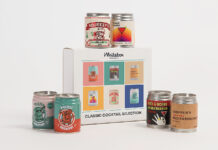On a blinding California afternoon, Andrew Alejandra makes his way through Rolling Hills Casino until he arrives at a bright, well-kept tasting room connected to its distillery. Eventually, Alejandra ducks through a half-hidden door to where the real magic happens. Beyond the 18-foot Vendome hybrid column, he catches sight of a genuine marvel: a torpedo-shaped copper and glass spirit safe with a massive chunk of pure obsidian at its core. Every drop of gin, vodka, and rum that’s produced by this operation runs through the safe and across the top of its raven-black stone.
Alejandra is the charismatic chairman of the Paskenta Band of Nomlaki Indians. He placed the volcanic spectacle in the safe himself, centering it there as an acknowledgment of his people’s ability to use obsidian for living and surviving. The stone helped the Paskenta carve out an existence as hunting river dwellers under the shadow of Mount Shasta for generations. But it couldn’t protect them from the politics of the 20th century. When the federal government revoked the Paskenta’s official recognition in 1959, allowing their ancestral lands to be easily divided by non-Native homesteaders, it looked like the tribe’s future was dealt a death knell. But Alejandra’s grandfather, Everett Freeman, refused to accept that. After traveling across California to find other Paskenta who’d been scattered to the wind, Freeman got the tribe fully restored by the federal government in 1994.
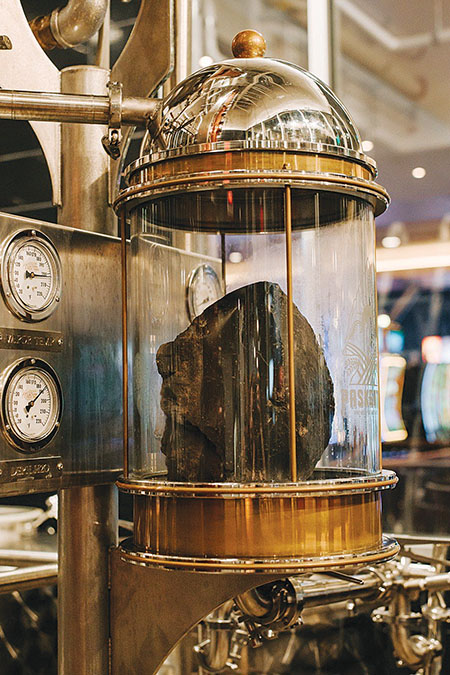
As Alejandra stands inside the distillery, christened Obsidian Spirits, he’s surveying the results of his grandfather’s visionary determination. That includes the entire casino, complete with stylish cocktail bars, sleek open-floored restaurants, and a 3,000-seat concert venue called The Obsidian Spirits Amphitheatre. Freeman’s cultural battles led to other monumental accomplishments, too, not the least of which involved providing jobs and health services for the Paskenta’s nearly 300 members. So, when another political wrong was redressed for Native Americans in 2018 — this time for tribes across the U.S. — Alejandra and the Paskenta saw an opportunity to channel their ingenuity into something creative.
Reclaiming the Right to Distill
It had started 550 miles to the north in the state of Washington, where the Chehalis Tribe had discovered, dissected, and ultimately defeated a federal law from 1834 making it illegal to operate distilleries on tribal land. The Chehalis’ legislative win was a victory for Native peoples everywhere. Rolling Hills Casino was right in the middle of a major remodel when the landmark decision came down. The Paskenta decided to pursue a new opportunity in the wake of the Chehalis’ work, building a distillery that could supply their own culinary and entertainment ventures while also pioneering a business opportunity for indigenous groups across California. The name Obsidian — and the herculean rock glinting in the spirit safe — is thought of as “sacred glass from the sky” by the Paskenta. Given that the tribe used the stone to overcome what nature threw at them, Alejandra sees a direct connection to their current business successes.
“Obsidian is a significant piece to the Paskenta people because we used it for protection, for hunting, for tools, for weapons,” he observes. “Today, we’re recognizing the way obsidian was used back then as a means to provide and protect. And that’s the whole concept of why we built this distillery — to continue to provide for, and protect, our people.”
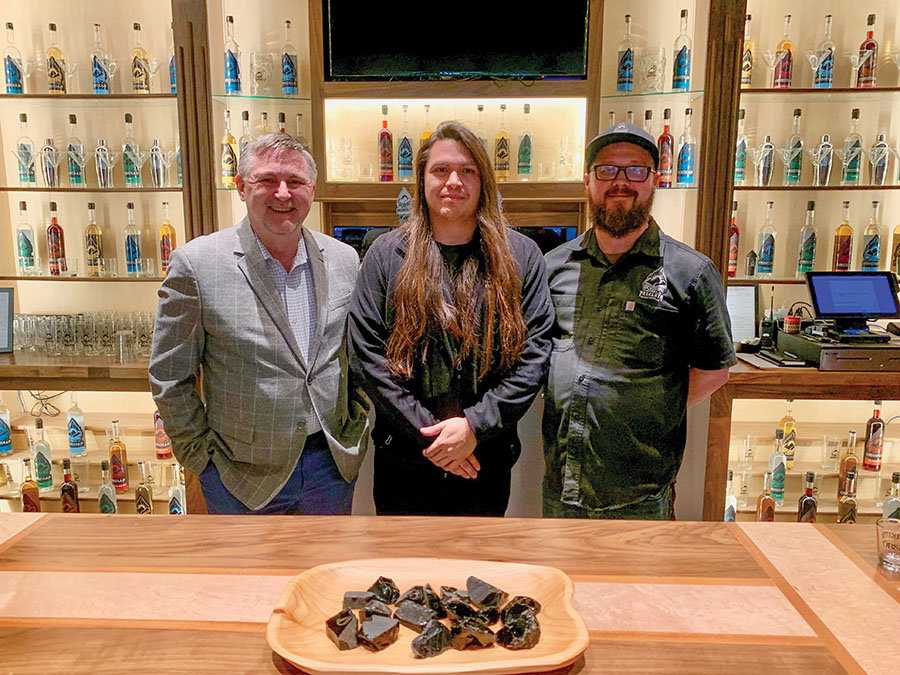
The tribe launched Obsidian Spirits by turning to distiller John Couchot, who had grown up in the area before learning his craft for years on the East Coast. Couchot helped set up the Paskenta’s facility, and he set the tone for its early products. Couchot’s sensibilities can be tasted in the intelligently flavored gin that Obsidian has released. Since then, the distillery’s been building its fan base through bright, clean-tasting vodkas and rums as well as an apple shine.
“We use the distillery’s products in our own restaurants, our bars, and our concert venue, and they’re proving to be popular,” says Steve Neely, the casino’s general manager. “We’re now getting to the point where we’re ready for distribution, and we think there’s real opportunity — and real interest — with other tribal businesses in California wanting tribally made products to serve.”
It was Neely, during a research trip to Kentucky, who first honed in on the idea of adding a powerfully symbolic spirit safe to the Paskenta’s approach. “There’s nothing quite like this one,” he notes, eyeing the half-natural, half-forged emblem at the heart of the distillery.
Alejandra has brought his own touch for thematic connections. A formally trained artist, the chairman has drawn the imagery for all of Obsidian’s labels and brochures. His conjurings pay homage to the landscape outside — low oak woodlands rolling toward Mount Shasta — along with the sharp, jagged staying power of an obsidian blade. Knowing that numerous Native cultures relied on the stone, Alejandra thinks that it’s only fitting that he should help other tribes find ways to safeguard and celebrate their cultures, including by sharing everything he’s learned about creating a distillery.
“Each tribe is unique in its own way, but in the end we have a lot in common with each other, in terms of our history and struggles, than we don’t,” he points out. “There’s more that binds us together.”
Even before Alejandra and the Paskenta started down this path, members of two other tribes in the U.S. were getting involved in distilling, both with a similar hope of sharing something memorable in a bottle while simultaneously giving back to their Native communities.
As the Crow Flies
Curtis Basina has known his wife Linda for nearly his entire life. The two members of the Red Cliff Band of Lake Superior Chippewa grew up around the city of Bayfield in northern Wisconsin. Their parents had been raised together on the Red Cliff Reservation. Curtis would hang out with Linda’s brother when he was a teen, and eventually he started dating her when the two were in high school. Later, Curtis and Linda got married.
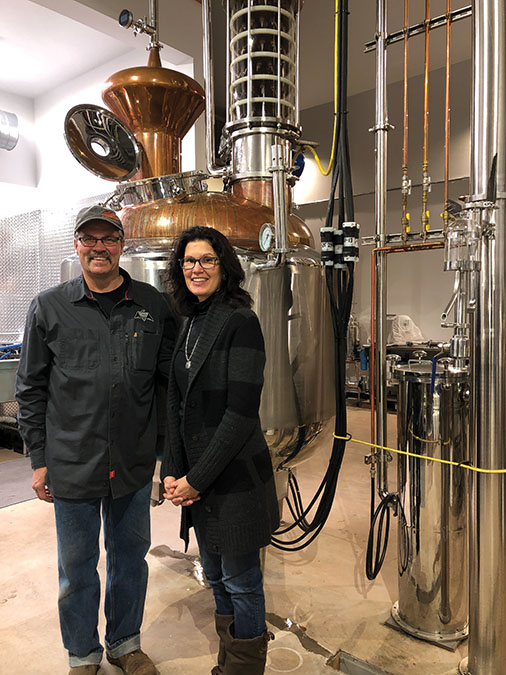
Curtis became a highway patrol officer. Linda worked in childhood education. Meanwhile, the reservation that had been part of their families’ orbit for so long was struggling. According to a grant application filed with the U.S. Administration for Native Americans in 2017, the Red Cliff Band of Chippewa are “often referred to as the smallest and poorest tribe in Wisconsin.” While many Red Cliff members are commercial fishers, the greater job scene has been bleak. A tribal census taken in 2018 found that 23% of the tribe’s population was unemployed, while only 37.4% had permanent full-time employment.
When Curtis surveyed this strife, he wondered why a rising tide of tourism in Bayfield wasn’t lifting all boats. The town is at the gateway to the Apostle Islands, a gorgeous Great Lake archipelago of lush forest-scapes and nature-chiseled cliffsides. The islands form a destination for sailing, fishing, hiking, kayaking, scuba diving, and orchard tours. After Curtis retired due to an injury, he started thinking about what types of businesses the region was missing. At one point, he and Linda attended an American Distilling Institute conference in Louisville, Kentucky. That’s when it dawned on the couple that Bayfield had breweries, wineries, and even cider houses — but no distilleries.
They started planning an operation within the reservation’s boundaries, one with access to the clean, beautiful water that came straight from the Lake Superior aquifer. The Basinas wanted that water to factor into the caliber of spirits they’d be making.
“If I had a stronger arm, I could probably throw a rock from the distillery and hit the shore of the lake,” Curtis says. “To Native peoples, water is life. So, here, we’ve got the cleanest, biggest freshwater lake in the world.”
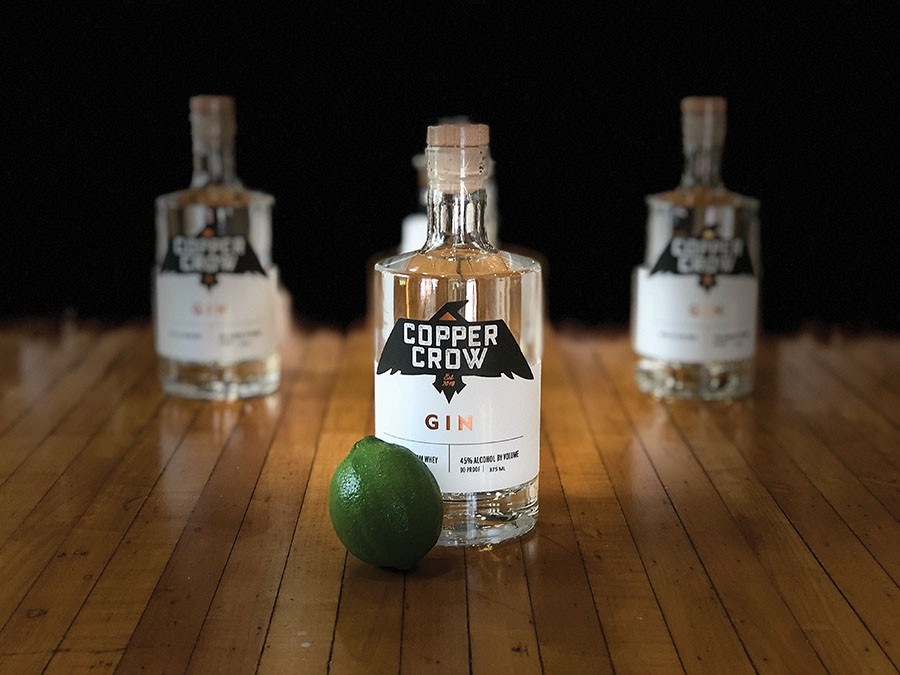
Curtis and Linda didn’t have to wait for the change in federal law. That’s because the Red Cliff Reservation is a patchwork of land, some of which is in trust to the Tribe, and some of which are regular private parcels. By carefully picking which spot they built on, the Basinas were able to have a distillery within the reservation but not on the reservation land itself. This allowed them to unveil the first Native-owned distillery in the country in 2017.
The couple christened their business Copper Crow. Its name has layers of significance when it comes to Chippewa heritage.
“Copper is something that’s a very strong part in the distillation process, but also — historically, in this area — something that was mined and traded for a time between the fur trappers that came here, and the Native peoples,” Linda explains. “The crow is a bird that takes good care of its family, teaching them to hunt and to care for each other. In the Native culture here, there is a story for all the woodland creatures around us. Each has a purpose in this life; but the crow doesn’t have a niche, and as it’s going around talking to other creatures, it finds that its niche is to help others find their niche.”
Curtis was confident that tourists and locals would enjoy Copper Crow, which would in turn allow him to provide production and tasting room jobs in the reservation. But he also thought that he should reflect Wisconsin’s broader identity in what he was distilling. It was Rusty Figgins of XO Alambic who suggested to him that Cooper Crow pursue this objective by honoring Wisconsin’s status as “the Dairy State.” More specifically, Figgins thought that Curtis should start experimenting with adding whey — a by-product of cheese — into the vodka and gin he was making.
“I thought, ‘I’ll accept that challenge and I’ll make it work,’” Curtis recalls. “And we have.”
Sourcing whey from Wisconsin’s Burnett Dairy, the Basinas have been creating unusual spirits that shine through specialty cocktails in their tasting room. Fresh, seasonal local fruits are a big part of their drink program. Curtis says that visitors are often interested in Copper Crow’s status as the first Native American-owned distillery. The symbolism in their story spurs repeat visitors and helps with word of mouth.
And it also helps the distillery operate as an asset to the Red Cliff Band of Chippewa.
“It’s so important that our young people, in particular, are given the opportunities to realize that they can have the American Dream, even if you are in an economically depressed community,” Curtis stresses. “For me, it’s about showing them that there are opportunities here, you just have to be able to reach out and grab them.”
Game-Changer
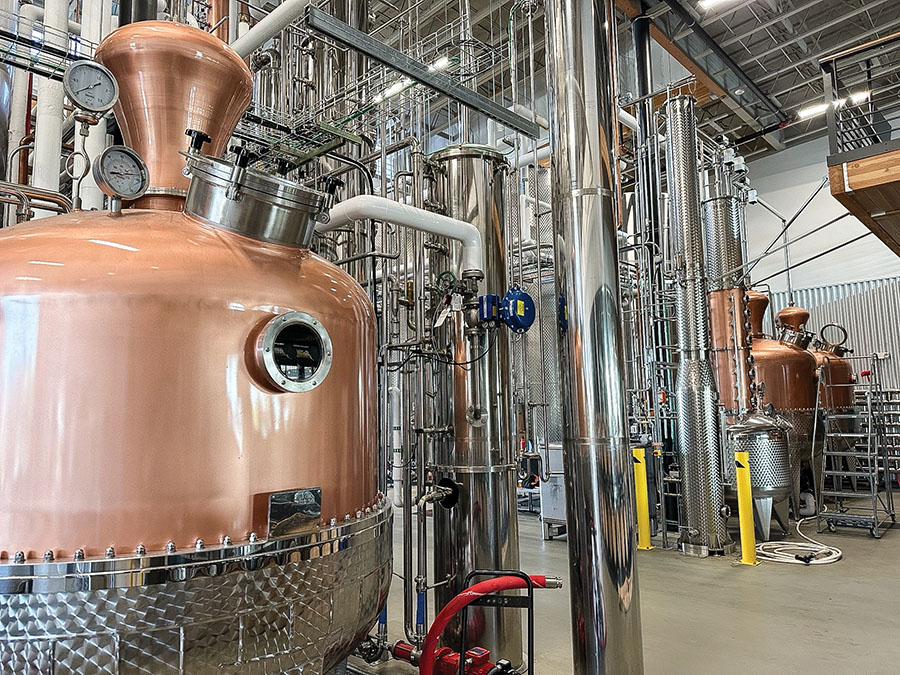
General Andrew Jackson may have been the great victor at the Battle of New Orleans, but President Andrew Jackson is largely considered the most hostile, indifferent, and callous occupant of the White House when it comes governing Native peoples. Given the tenor of “Old Hickory’s” administration, it’s perhaps not surprising that the Congress from his era passed a discriminatory law banning all types of distilleries from existing on tribal land.
The prohibition wasn’t something that was widely understood by future generations of Native Americans. The Chehalis Tribe only found out when it was planning its own brewery and distillery. Greg Burnett, a tribal member and director of operations, said the idea to build a distillery was part of diversifying the Chehalis’ revenue portfolio.
Adaptation is a skill the tribe has learned the hard way.
Though they’ve lived on the landscape of the Chehalis River watershed since before written history, the tribal members’ longtime occupation as fishers was being undone by the late 1970s. At that point, some Chehalis working the rivers made less than $1,900 a year. Hoping to drive employment, as well as pay for medical support and social services, the Chehalis opened the Lucky Eagle Casino in 1995. But they didn’t stop there. The Chehalis understand the nature of boom-and-bust economies, so they opted to bolster their gaming revenue by adding a massive indoor water park and resort in 2006. After that, they began setting their sights on a restaurant, brewery, and distillery to get more financial stones in the fire.
“We’re seeking to diversify in ways that will not make this a three-legged stool — we don’t want it to fall over if any one element fails,” Burnett says. “We’ve undertaken initiatives in the last 25 years to reaquire land that would have been Native land to our people and restoring the condition of the land in various ways, preserving the river, the watershed, the fish returns.”
Burnett adds, “In tribal business, nothing is ever easy. When we built the water park, that was a massive lift in getting the federal government to acknowledge off-reservation contiguous land as reservation land. So, economic development in Indian Country is never like going to a broker, finding some land, and signing a lease.”
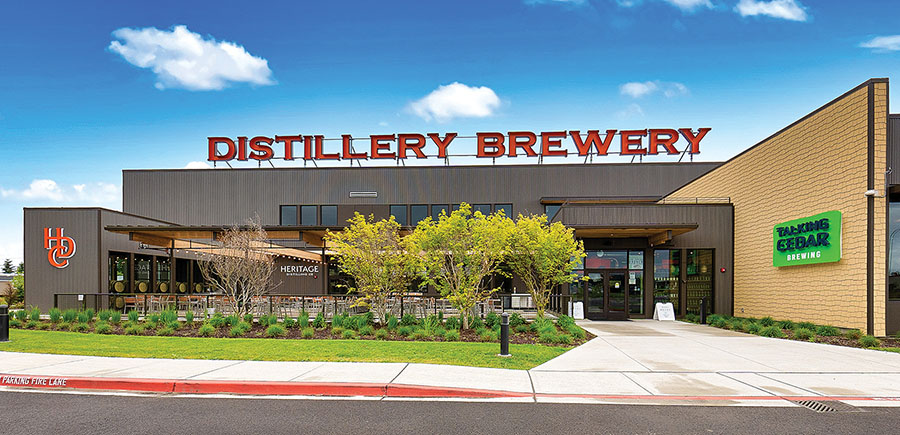
And it certainly wasn’t when it came to the distillery.
The tribe’s legal team eventually discovered the anti-distillery law dating back to Jackson. “Not only was it an ugly holdover from that period, but it turned out the only place in the entire United States that you could not build a distillery was in Indian Country,” says the tribe’s attorney, Harry Chesnin. “It basically authorized what used to be ‘the Indian Agent’ — what is now the Bureau of Indian Affairs — to come on the reservation and knock down the distillery, along with leveling a thousand-dollar fine.”
The Chehalis decided to take action. They started working with Congresswoman Jaime Herrera Beutler on the Republican side of the aisle as well as Congressman Derek Kilmer, a Washington Democrat in the sixth district. The two legislators sponsored a bill.
“Much to everyone’s surprise, we got the bill through Congress, approved and signed by the president in ten months, which is virtually unheard of,” Chesin reports. “It’s a point of pride, from the tribe’s perspective, that it was able to address the inequities of federal legislation in a particular way.”
Working in partnership with Heritage Distilling Co., the Chehalis constructed Talking Cedar Distillery, an operation with a 40-foot column still, a 2,000-liter gin still, two 3,000-liter pot stills and 64,000 gallons of fermentation capability.
“The first thing you’re going to see from us is a gin using foraged ingredients from across the Pacific Northwest,” says head distiller Brian Downing, a veteran of Stitzel-Weller and George Dickel. “It’s a riff on a London dry gin, but we do have the benefit of using traditional local herbs and botanicals. We also have a very unique relationship with the state of Washington in that we can forage effectively anywhere; and we can also harvest and collect what the state considers to be invasive plant species on tribal land. For us, that gets back to that idea of land stewardship.”
The gin’s tie to the Black River area is something Burnett is excited about. “With our gin, we can source botanicals using boots and a backpack within five miles of where we’re sitting,” he explains.
Downing said that Talking Cedar is also working on two different whiskeys with all-Washington grains. “We’re going to be able to make both single grain and single malt under one roof, which is pretty fantastic and not a lot of distilleries can offer that,” he points out. “And I think you’ll eventually see some very unique-looking products in the whiskey category, like a whiskey rosé. It’s pretty fascinating stuff. Delicious, young — and I think we’re going to start challenging what it is to drink young whiskey here in America.”
Whatever Downing comes up with, it’s important to the Chehalis that they work with local and regional farmers. “It further speaks to the economic engine that we can drive in our valley,” Burnett says. “This is where we always were and always have been, and we want not only our membership to thrive and succeed, we want the people around us to thrive as well.”



